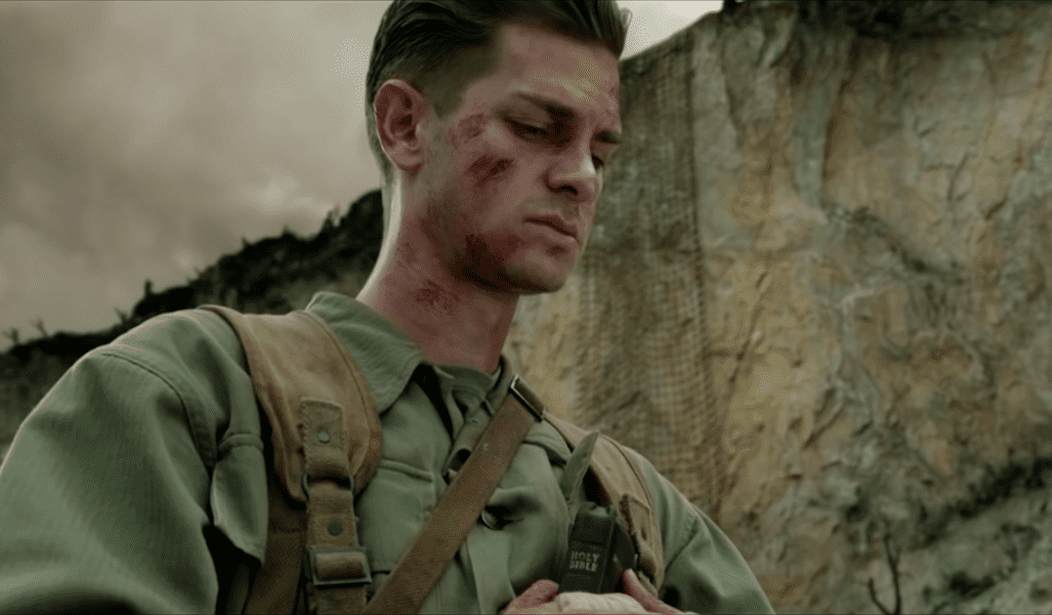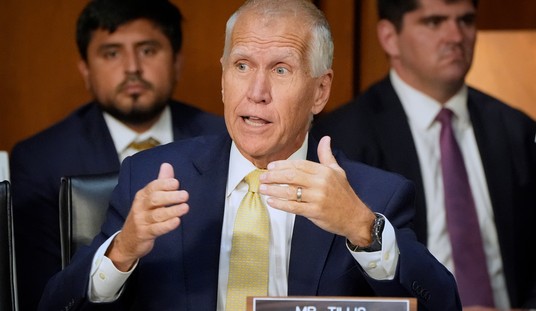Mel Gibson’s Hacksaw Ridge is easily one of the best films of the year (89 percent on Rotten Tomatoes), but it’s not primarily due to cinematic effects. Perhaps better than any other, the movie portrays the vital struggle for religious freedom, and what a Christian must do with that hard-won victory.
Indeed, Hacksaw Ridge is really two movies — one about fighting for religious freedom, and another about the heroism of Christian faith in the face of hellish adversity. One about achieving the freedom to live out the faith, and one about how to honor that freedom. It tells the heroic tale of Desmond Doss, a conscientious objector who felt it his duty to serve in World War II, but who refused to take up arms.
Doss — played by Andrew Garfield (The Amazing Spiderman, 2012) — calls himself a “conscientious cooperator” and explains that he wants to serve on the battlefield, but he has a problem with “carrying a gun and taking a human life.” His solution? Become a battlefield medic.
From the beginning, Doss struggles to follow his conscience. He earnestly believes he must fight in the war, despite pressure from his father (and later his commanding officer) to stay home and let others fight for him. He also earnestly believes it is wrong to kill, and he refuses to even touch a rifle, no matter how much it costs him. As he tells his wife, “I don’t know how I’m gonna live with myself if I don’t stay true to what I believe.”
His commanding officer does not take kindly to that idea. When Doss refuses to train with a rifle, the squad mocks him. In a disgusting moment, his fellow soldier drags him through the mud, saying, “I don’t think this is a matter of religion. I think this is cowardice.”
This might remind many conservative Christians today of the common retort from the LGBT movement when Christians voice concerns about gay marriage or transgenderism. That retort could be paraphrased, “I don’t think this is a matter of religion. I think this is discrimination.” Christians today need to show forth in our lives that there is a crucial difference, and Desmond Doss teaches us how to do so.
Similarly, liberals think conservative Christians oppose abortion, gay marriage, and transgenderism in order to say that they’re “holier than thou,” to prove some sort of superiority. Doss’s fellow soldiers also suspect the private refuses to shoot a rifle for the same reason. Only his later heroism proves them wrong.
Beaten to a pulp, thrown in military prison, and taken before a tribunal, Doss must fight for what he believes in. The Army tries to push him to resign, but Doss refuses. He wants to serve his country and he will not sacrifice his conscience, one way or another. Eventually, the Army acknowledges his right to serve without a weapon. “Private Doss, you are free to run into the hellfire of battle without a single weapon to protect yourself,” and so he does.
Next Page: What Doss does with that freedom.
Having literally bled in order to secure his freedom to save lives on the battlefield, Doss goes on to prove his mettle in the notorious Battle of Okinawa. The fighting takes place on a ridge, known as “Hacksaw Ridge” because Americans would take it and then be pushed off by the Japanese shortly afterward. As Doss’s company arrives, they see the last company leaving, with truckloads of dead and dying soldiers. On the ridge itself, troops must clamber over decaying corpses as they dodge gunfire and grenades from the Japanese.
The action is gruesome and stomach curling, but it serves an important purpose. The New Yorker‘s Richard Brody argues that the “pornographic violence” actually “expresses a pleasure in staging and observing such grotesque and horrific violence—a pleasure that’s immediate, extra-moral, and personal.” Judging by the revulsion of my fellow audience members, I must disagree. Hacksaw Ridge is true to the history, and its violence merely highlights the heroism of its main character.
While soldiers are dying around him, Doss stays at the front of the line, tending to each wounded American. Yes, human flesh goes flying, limbs are busted, and men die slowly and in pain. But Doss risks all of these injuries and more, staying right up next to the action, so he can save each soldier just after he gets wounded.
But the heroism doesn’t stop there. When the troops abandon the ridge, this plucky medic stays up there. The American Navy shells the ridge to prevent the Japanese from following American troops down, but the exploding shells do not deter Private Doss. As most of the troops have left the ridge for safety, Doss remains to tend the wounded.
Long into the night and throughout the following day, the medic returns to the battlefield, dragging one wounded soldier after another to safety. After dropping each one with a rope down from the ridge, he runs back into danger, praying, “Please Lord, help me get one more.” Doss runs back and forth, dragging soldier after soldier to safety and care, risking discovery by the Japanese, who are known to target medics especially for death. Hour after hour, he slowly lowers wounded soldiers with a rope, eventually leaving his hands ripped and bloody.
Doss’s actions also stand out when compared to the cruelty of the Japanese. Not only do they target medics for death, they also do not value their own lives. The movie shows a general committing seppuku, the noble suicide of his people, a perfect contrast to the lowly Private Doss who risks his own life to save others. Both are committing a kind of suicide — one to save the lives of others, one to save a man’s own honor. The juxtaposition is compelling.
Doss does not just fight for his religious freedom, he uses it to serve God and save others. The bravest man in his company does not even touch a rifle, and he goes to war to save life, not to take it.
Next Page: The vital lesson American Christians should take from the story of Desmond Doss.
Desmond Doss is a pacifist serving in the army — a living contradiction. That is exactly the kind of life Jesus calls Christians to live: to be in the world, but not of it.
Christians do not need to interpret the Sixth Commandment (or the Fifth for Catholics) — “Thou shalt not kill” — in the way Doss does. There is a long tradition of just war theory, explaining how Christians can accept war and take up arms in defense of their country or in a justified war. But Doss has his own reasons, and if any place should accommodate religious freedom in war, it’s the American military.
In the end, Doss’s battle for religious freedom is inspiring less because of how he faces the prejudice of others (with courage and determination), but because of what he does after receiving that freedom. Religious freedom is about securing the right to live according to our faith. The harder part is actually doing so when we have that freedom.
Let’s not kid ourselves — American Christians have a great deal of religious freedom and we don’t always use it. We can minister to the sick, we can help the needy, and we can do so in the name of Jesus Christ. We can go to church on Sunday, even if we were once Muslims. People in Saudi Arabia, Egypt, Iran, and in other countries cannot do that. In many parts of the world, if you leave Islam you will be marked for death. In America, you can choose a different religious denomination every week.
But in other ways, religious freedom is certainly under threat in the United States today. When a Christian bakery is fined $175,000 just for refusing to bake a custom cake for a lesbian wedding, that’s a problem. When the city of Houston and the state of Georgia demand pastors hand over their sermons to the government, that’s a problem. When the state of Massachusetts declares that churches must open their men’s and women’s bathrooms to people of the opposite sex, that’s a problem.
In many cases, these infringements are done in the name of progress, in the name of being inclusive to the LGBT movement. True Christians should already be inclusive to all people, no matter their sexual orientation or gender identity. But Christian doctrine comes from Jesus Christ, and Jesus defended traditional marriage and sexuality. We should love LGBT people, while emphatically rejecting LGBT ideology.
Christians rightly demand the religious freedom to refuse to partake in gay weddings and to defend the privacy of their sex-segregated bathrooms. But it really does matter how we use those freedoms. It’s not enough to have religious freedom — we also need to preach the gospel, with our words and in our lives. Jesus did not die to preserve the sanctity of marriage, he died to save sinners from death and hell. If we really believe His message, we should reach out to fellow sinners.
Desmond Doss did not fight for religious freedom in order to say he was holier than his comrades. He didn’t refuse to pick up a rifle just so he could belittle those who did. He defended his right to live by his conscience so that he could lay down his life in service, despite the way his fellows mistreated him.
Christians need not be as heroic as Doss in our daily lives, but we do need to show the culture why religious freedom is important — and heroic actions on behalf of the poor and especially, if possible, for LGBT people without condoning LGBT ideology, are a good place to start. Liberals might never understand why we believe what we believe, but they might respect us more if they see the sacrificial love of Christ in our lives. Praise God for Desmond Doss, who showed us how to do that.
Watch the trailer on the next page.









Join the conversation as a VIP Member